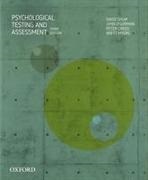Read more
Psychological Testing and Assessment is a comprehensive introduction to theory, research and best practice for psychological testing and assessment in an Australian context.
List of contents
- Part 1: The Context of Psychological Testing and Assessment
- 1: Psychological Tests: What are they and why do we need them?
- 2: Psychological Testing and Assessment: Processes, Best Practice and Ethics
- Part 2: Methodological and Technical Principles of Psychological Testing
- 3: Test Scores and Norms
- 4: Reliability
- 5: Validity
- 6: Test Construction
- Part 3: Substantive Testing and Assessment Areas
- 7: Intelligence
- 8: Personality
- Part 4: Areas of Professional Application
- 9: Clinical and Mental Health Testing and Assessment
- 10: Organisational Testing and Assessment
- Neuropsychological Testing and Assessment
- 12: Forensic Psychological Testing and Assessment
- 13: Educational Testing and Assessment
- Part 5: Prospects and Issues
- 14: The Future of Testing and Assessment
About the author
David Shum is a Professor and Dean (Research) in the Health Group, Griffith UniversityProfessor, Dean (Research) and a member of the Menzies Health Institute of Queensland in the Health Group at Griffith University.
John OGorman is an Adjunct Professor in the Health Group at Griffith University.
Peter Creed is a Professor in the School of Applied Psychology and a member of the Menzies Health Institute Queensland at Griffith University.
Brett Myors is an Adjunct Associate Professor in the School of Applied Psychology at Griffith University.
Summary
Psychological Testing and Assessment is a comprehensive introduction to theory, research and best practice for psychological testing and assessment in an Australian context. The text examines key principles, provides varied examples, discusses local issues and addresses the Australian Psychological Society's Code of Ethics. Covering the latest in theory and research, it provides students with a practical and accessible guide to the dynamic and evolving field of psychological assessment.
The third edition has been updated to incorporate the latest theory and research, and now has expanded coverage of controversies, cross-cultural assessment and

